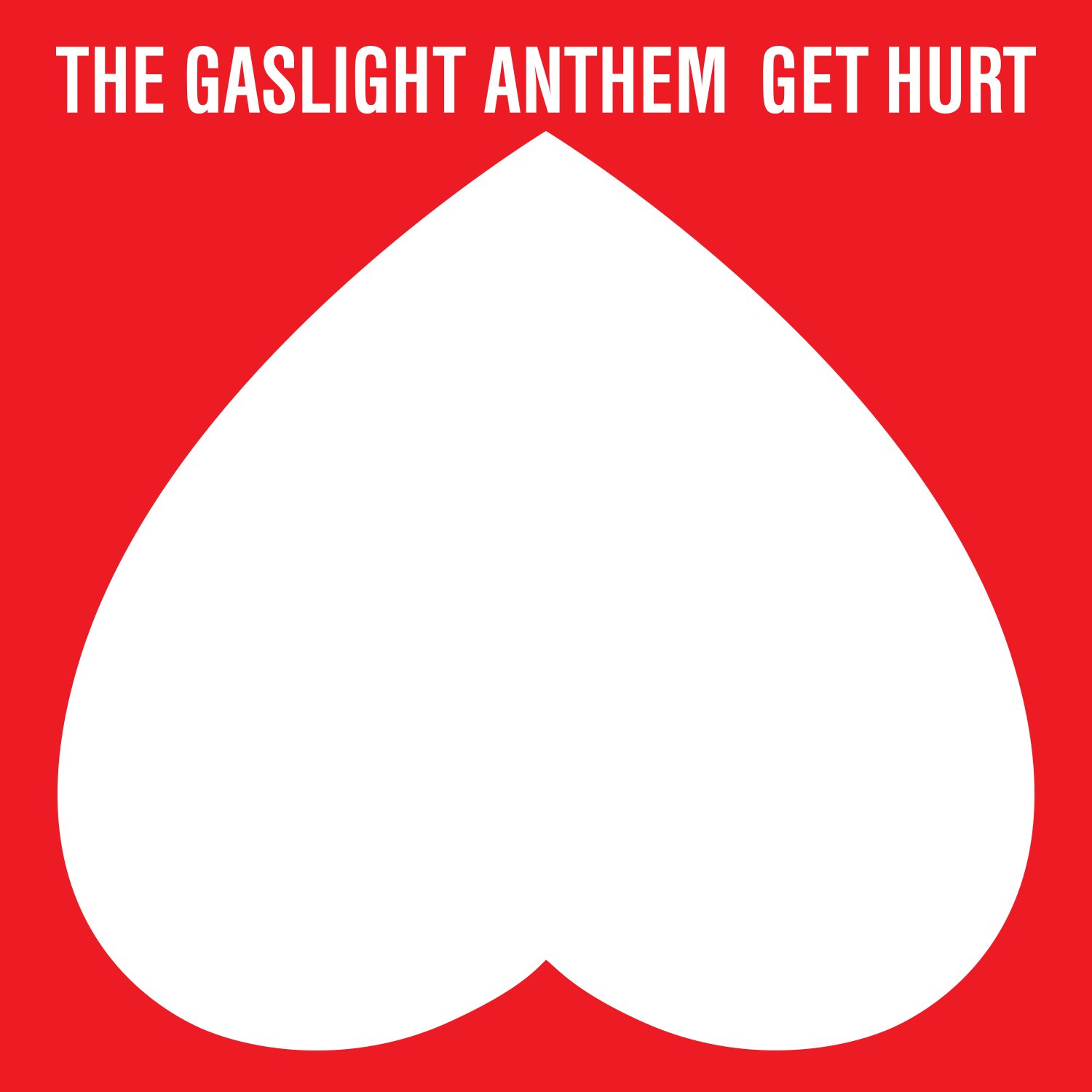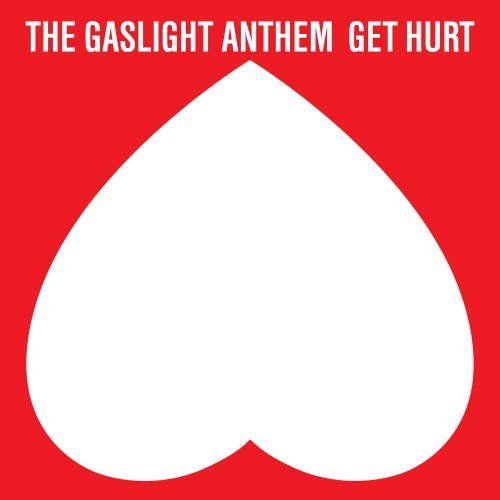
In the trend of recent conversation pieces, Blake (B.I.C.) and I bring you a discussion of The Gaslight Anthem’s newest album Get Hurt.
Carl: First off, how do you feel about “break-up” albums? Intense emotional pain and torment have produced classic albums like Blood on the Tracks, but more often than not I find “break-up” records to be less interesting than others. Get Hurt is certainly a “break-up” record, and while that adds an emotional rawness missing from Gaslight Anthem’s earlier work, I felt as if Fallon’s lyrics lost some of the universality they have on Handwritten and The ’59 Sound.
 Blake: As far as “break-up” records go, they are hit and miss for me, too. The ones I like are largely in the soul category, like Marvin Gaye’s Here, My Dear (1978). Rock “break-up” albums tend toward either self-pity or sentimentality. There may be hints of both on Get Hurt, but nothing that makes me want to discard the album wholesale. I do agree that break-ups tend to be more personal and exclusive to those involved, whereas falling in love (which was represented in part on Handwritten and some of their other material) usually allows more general room for connection or, as Fallon put it, “blood on the page.” Even then, though, I enjoy the way Fallon approaches lyrics. It strikes a nice balance between The Hold Steady’s regional and spiritual immersion and singer/songwriters who try for levels of meaning. The Horrible Crowes album sealed Fallon as a personal favorite lyricist for me. This may not be his strongest work, but I still appreciate it on the whole.
Blake: As far as “break-up” records go, they are hit and miss for me, too. The ones I like are largely in the soul category, like Marvin Gaye’s Here, My Dear (1978). Rock “break-up” albums tend toward either self-pity or sentimentality. There may be hints of both on Get Hurt, but nothing that makes me want to discard the album wholesale. I do agree that break-ups tend to be more personal and exclusive to those involved, whereas falling in love (which was represented in part on Handwritten and some of their other material) usually allows more general room for connection or, as Fallon put it, “blood on the page.” Even then, though, I enjoy the way Fallon approaches lyrics. It strikes a nice balance between The Hold Steady’s regional and spiritual immersion and singer/songwriters who try for levels of meaning. The Horrible Crowes album sealed Fallon as a personal favorite lyricist for me. This may not be his strongest work, but I still appreciate it on the whole.
Carl: Speaking of lyrical gold, there are a couple lines on “Stray Paper” that get me every time: “Now we’re much too old for this/ I don’t feel those kind of things/ So don’t you cry for me, I used to feel everything.” All of a sudden I’m back in high school, before I was so cynical. Perhaps Fallon, due to emotional turmoil, is attempting to return to those days when emotions and feelings weren’t trampled under the boot heels of “adulthood.”
Blake: That’s another part of his writing I’ve always appreciated as well: the interplay between nostalgia and reality. Even though a lot of his songs revolve around looking back on past events or relationships in a way that feels nostalgic, he never leaves it there. Maybe that’s because he, and the listener (from their own experiences), know that how we remember things and people is often distorted. This album strikes me as Fallon giving up on such memories and letting reality be the driving force.
Carl: Musically, Get Hurt aches—jagged guitar solos slicing through melancholy bass, whispered vocals over steady drumming. Even the ostensibly happy songs like “1000 Years” burn with regret, and you can hear it in Fallon’s weary voice. I think that’s part of what makes this album a departure for the band; this time the raggedness and exhaustion are real, not just stories about other people. The emotional core of the album hits hard.
Blake: Fallon has one of the best rock voices in the business right now. You’re right–there’s a world-weariness that speaks beyond his age. As for the music itself, I’d say it feels generally more emotive than on their other records. It almost seems that the music moves this album rather than the lyrics. I remember the band saying that Pearl Jam was a big influence on this album, and they are certainly another band where the music often moves me more than the words. Get Hurt is clearly a very personal piece of work. It’s like Fallon decided to go against his own advice on the last album’s “Too Much Blood” and just put his own stories on the page instead of vicariously living through middle-man narratives, hence the exhaustion and raggedness.
Carl: I view the essential songs on Get Hurt as “Get Hurt,” “Underneath the Ground,” “Red Violins,” and “Dark Places.” By essential, I mean these are the songs that tap into the sorrow and pain and attempt to manufacture something else from that pain. They search for some kind of catharsis in a way the rest of the album doesn’t.
Blake: I totally agree with you, especially re: “Get Hurt” & “Red Violins.” They have a certain transcendence that anyone who has experienced heartbreak can connect with. In other words, they work because they do what Handwritten did as an album, they connect universally. The rest of the songs seem like personal engagement with the transcendental aspects of those four songs. Not to mention, I watch the music video for “Get Hurt” a handful of times a week. It’s just beautiful, a great example of the recent influx of modern dance choreography in music videos.
Carl: The video for “Get Hurt” is excellent, as are most of Gaslight’s videos. The one for “Rollin’ & Tumblin’” is similar, albeit with a playful edge, until you realize the dancers are painted like skeletons. I had this experience with many of the songs on the album… I heard the music (sounding like normal Gaslight) and then I listened to the lyrics and realized something deeper and more powerful was going on under the surface.
[youtube=https://www.youtube.com/watch?v=I_TI14Z5NNQ]
Carl: Is it a coincidence that we start the album with “Stay Vicious” and end with “Dark Places”? It’s as if Fallon knows that these emotions of anger, fear, and regret lead nowhere good, but yet (like most of us) he is powerless to change his emotional state of mind. “Now I’ve had the saints and patience…and something that used to resemble a soul,” he sings on “Stay Vicious,” the first of many references to “soul” on the album—a burdened, heavy soul, but a soul nonetheless. Unlike other Gaslight albums, redemption only shows up sparsely on Get Hurt. But the key thing is that its possibility remains somehow, even amid the deep, dark sorrow that causes Fallon to end the album with the line: “I become the dark in the places where you live.”
Blake: Very interesting, and I’d agree. Redemption is hard found and hard fought on this album, and yet, the spiritual and Christian allusions also seem heavier than they were on any of their other albums. The soul, Jesus, Holy Ghost, are all prominently name-dropped. Their earlier albums felt richer in redemption and joy, but were largely lacking such strong religious terminology. Depending on how you look at it, this could be good or bad. One could say that they’re being more blunt, or maybe preachy, and less creative and descriptive. Then again, the religious vocabulary here does not lead to happy imagery of salvation and all things working out…matter of fact, quite the opposite. And I love what you say about Fallon’s recognition of it being a bad road to go down and yet feeling powerless to stop from traveling it. That’s when transparent prayer is at its most urgent and needed.
Carl: For me, “Red Violins” stands out as the key song on Get Hurt in this spiritual struggle. I love the music, but the first verse just nailed me: “There were red violins playing in my dreams/ One for me, and two for me, and one at Jesus’ feet.” Jesus shows up in the darnedest places, huh?
Blake: I really love everything about that song. The prophetic imagery speaks less to Christian eschatology and more to relational eschatology…the end of a weary relationship. I found it to be an effective allusion with tons of metaphorical and allegorical meaning that could be interpreted into it. Jesus, no doubt, shows up in all the “wrong” places. But did we expect anything less from a Savior?
Carl: Wrapping this discussion up, I’d say the album is musically strong, but missing some of lyrical hooks of earlier Gaslight albums. Then again, it may need to grow on me a little more. At times, it can feel flat, but when it connects, it really connects.
Blake: With all Gaslight albums, I find the road test is often more telling than anything else. Does it travel well? It may not have traveled as well as Handwritten or The ’59 Sound thus far, but it is not devoid of those elements either. Hopefully you’re right that it’s a sleeper. Kinda like Cold War Kids’ Dear Miss Lonelyhearts was for you last year!
Carl: Indeed! As a whole, I think it’s another strong entry into the band’s discography. Definitely an album that will be getting a lot of plays as I walk to and from campus! Any other final thoughts?
Blake: It will be interesting to see where the band will go from here. Handwritten was a definite departure in sound and style and it fit really well. Get Hurt continues within that same sound and style, albeit with differing influences. It’s that general tension of being a fan: being excited about a new album coming out and, yet, the fear that experimentation might result in something that you just don’t like. But Gaslight has done well so far, so most of my fears are assuaged.
[youtube=https://www.youtube.com/watch?v=iy8hLP3SFkk]

COMMENTS
Leave a Reply












